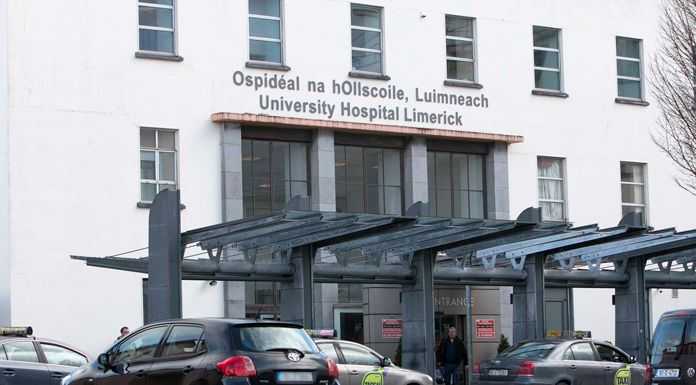
WITH 80 people waiting for beds on trolleys and overflow wards in the University Hospital Limerick having been admitted through the Emergency Department, hospital management have appealed this Monday for people too look at options before coming to the ED.
UL Hospitals Group is appealing to members of the public to consider all their care options before presenting to the Emergency Department at UHL.
The hospital is currently managing high volumes of patients including significant volumes of frail elderly patients with chronic conditions and complex care needs.
UL Hospitals apologises for any distress or inconvenience caused to patients or their loved ones who have experienced long wait times in the ED at UHL, and we would like to reassure patients and their families that we are working to alleviate the situation.
UL Hospitals Group has seen a sustained increase in attendances year to date. It should be noted that prior to Storm Emma, the increase in attendances was up 17% in Feb 2018 which has created significant pressure for beds. The numbers of patients attending the ED following the severe weather over the last week has been very high, with very ill patients presenting leading to an increasing number requiring admittance to a ward.
In additional there are 16 patients with flu being accommodated across the Group. While the flu rates are on the decline we are now 12 weeks above the baseline which makes it the worst flu on record in terms of its longevity. This is leading to a significant increase in isolation requirements.
UL Hospitals Group can confirm that at 8am on Monday March 12th, there were 55 admitted patients in the Emergency Department at UHL. This included patients who were being accommodated in some of the 49 single rooms/designated bays within the new department. It included, for example, 11 patients who were appropriately isolated in single rooms in the ED for proper infection prevention and control. A shortage of appropriate isolation facilities elsewhere in the hospital makes this the best solution in the interests of all patients.
In addition there were 24 patients accommodated on extra beds and on trolleys on wards.
Additional surge capacity was being used to accommodate admitted patients in beds in the Acute Medical assessment Unit (15), the Surgical Day Ward (10). These units have appropriate inpatient accommodation and their use in this manner forms part of the hospital’s escalation plan, which is put into effect at times of high demand.
Transfers continue to Ennis, Nenagh and St John’s hospitals with these hospitals also operating to capacity.
There will be some curtailment of non-urgent elective procedures over the coming days as we prioritise inpatient beds for those patients waiting in the ED. All patients affected are being contacted and their appointments will be rescheduled.
Members of the public are urged to consider all their care options at this time and not to attend the Emergency Department unless necessary.
Injury Units in St John’s, Ennis and Nenagh hospitals are open for appropriate injuries. Injury Units are open in Ennis and Nenagh Hospitals from 8am to 8pm, Monday to Sunday and 8am to 6pm Monday to Friday at St. John’s Hospital. Others with a less serious illness can be treated by their GP or out of hours GP service where their GP can refer them to an Assessment Unit the following day if required.
However, if you are seriously injured or ill or are worried your life is at risk the ED will assess and treat you as a priority.
Other measures are being taken to relieve pressure on the ED are additional ward rounds to facilitate discharges; the transfer of suitable patients from UHL to Ennis Hospital, Nenagh Hospital, St John’s Hospital and Croom Orthopaedic Hospital; the transfer of appropriate patients to community care settings and maximising access to Homecare packages and Transition care; working closely with Community Intervention Teams to provide antibiotics and other basic care in a patient’s home or care facility and communication with GPs to ensure patients are referred to ED only where appropriate.
More about health here.








